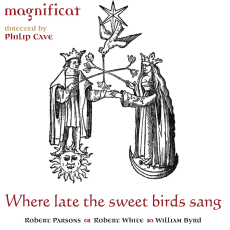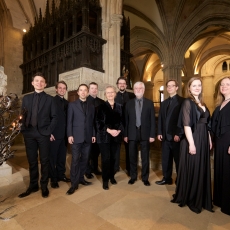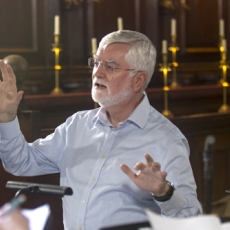Magnificat - Where Late the Sweet Birds Sang - Music Web International
The title is a quotation from Shakespeare's Sonnet 73 in which he compares his winter mood to ‘Bare ruin'd choirs where late the sweet birds sang.' Since Empson's Seven Types of Ambiguity this has usually been taken to refer to the remains of the abbeys which were dissolved under Henry VIII and which had mostly fallen into ruin by his time, the stone having been removed for building, and the singing of the sweet birds to the plainer style, setting English not Latin words, which had replaced the ‘late' (former) elaborate polyphony of the earlier half of the sixteenth century.
The interpretation is not universally accepted - some prefer to regard the image as one of avenues of leafless trees in winter - and, indeed, given the richness of Shakespeare's imagery it's possible that he wanted to evoke both images. As a peg on which to hang a short selection of Latin-texted music from the latter half of the century, however, it will serve very nicely.
About William Byrd's loyalty to the Roman church there can be no doubt, though his beliefs appear to have been tolerated at court, where he composed in English and Latin for Queen Elizabeth's Chapel Royal, but the tenor of the two texts which are included here - how shall we sing the Lord's song in a strange land? and part of the Lamentations of Jeremiah, bewailing the fate that has vertaken Jerusalem - shows how much he regretted what had been lost. There is, indeed, a series of settings by Byrd and his Catholic contemporaries that seem to have been intended as a kind of dialogue, often on the theme of loss.
It's a measure of the quality of Magnificat that I can mention their singing of the four Byrd works on the new recordings in the same terms as King's and the Tallis Scholars. That comes as no surprise in view of the number of fine recordings that they have already made for Linn; I'm running out of superlatives to describe them.
Magnificat, who have shown themselves to be ideal interpreters of the more elaborate style, are just at home with this plainer music; their performances are restrained and intimate without in any way under-valuing what they sing.
This is one of three recent Linn releases which they have kindly provided for me in both SACD and 24/96 download format - both the CD and SACD 2.0 layers and the download sound excellent.
An excellent release is made even more so by the first-rate notes from Sally Dunkley, who was responsible for editing the music here, and a further note from Philip Cave on pitch.
This is another triumph for Magnificat and Linn.


